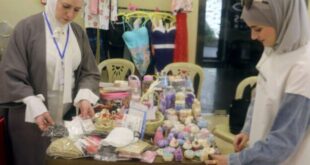Damascus, SANA – Away from the sophisticated technology which, for many, has somehow deprived textile and handicraft arts from their peculiar nature, Syrian knitters and weavers have sought to revive the traditional way of making textiles followed by their ancestors through relying on handlooms once again.
A handloom is a device used to weave cloth with the basic purpose of it is to hold the warp threads under tension to facilitate the interweaving of the weft threads. The precise shape of the loom and its mechanics may vary, but the basic function is the same.
Backed by the Syria Trust for Development, a non-governmental, non-profit organization that works on empowering individuals and communities in Syria to fulfill their role in building their society and shaping their future, Syrian weavers have been able to refine their skills and carry out their small businesses through which they came to develop their crafts.
Craftsman Ibrahim Ayyoubi said that he inherited his textile craft from his father, who he said was one of the oldest professional knitters and the one “who taught me the secrets of the career and how to weave the Damascene brocade on the handloom.”
Ayyoubi added that handmade crafts and arts have been enjoying increasing popularity recently, especially among women, and left their mark in the leather industry, “as we now see women’s bags and many other products beautifully embroidered with loom-knitted artistic shapes and figures.”
“As-Suriya for Handicrafts” is one of an array of initiatives and programs that have been launched by the Syria Trust for Development in the framework of boosted efforts, including by government and civil parties, to support small enterprises and encourage young people to start their own businesses.
The program works on providing support for local craftsmen and artisans as well as documenting, revitalizing, developing and modernizing traditional products and crafts. It has started granting small loans to owners of small businesses.
Ruaa al-Jazaeri / Haifa said
 خبرگزاری جمهوری عربی سوریه Syrian Arab News Agency
خبرگزاری جمهوری عربی سوریه Syrian Arab News Agency




